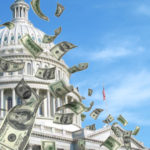The possibility of additional future state tax reform or tax cuts improved Monday under a new version of the pending bill that puts Virginia into conformity with the federal Tax Cuts and Jobs Act. The resulting tax revenue not returned by the modest policy changes in this bill are to be held in reserve for future action.
The language in the bill now better matches the earlier rhetoric about preventing a huge inflow of new income tax revenue.
The legal reality is no General Assembly can bind a future one, so the 2020 session could disband this new fund and just spend the money. But it is a stronger statement of policy and intent, and perhaps will add focus to the debate over tax policy which is inevitable in the 2019 legislative elections.
Both chambers of the Virginia General Assembly have now approved that new version, with only one more procedural vote required before it goes for consideration to Governor Ralph Northam. He is expected to sign it promptly so it can apply immediately to tax returns now being filed.
The bill still calls for a one-time lump sum rebate to all taxpayers later this year to compensate for the additional revenue collected by the state for tax year 2018. It includes the 50 percent increase in the standard deduction for taxpayers who use that method starting in tax year 2019, plus the two deductions sought by large business taxpayers and that Virginia version of the Pease limit to cap itemized deductions by the wealthy.
The significant change that appeared Monday deals with any excess revenue generated by conformity over the next few years not returned by those provisions in the bill.
A language provision establishing a non-reverting “Taxpayer Relief Fund” will now hold any additional revenues collected up through 2025. The fund is to be used “to effectuate permanent or temporary tax reform measures,” also a new phrase. But those will likely be left for the 2020 or even a later General Assembly to decide.
There is no distinction in the language between additional tax revenue from individuals and from corporations, so the earlier concern that Friday’s version constituted a corporate tax increase may no longer pan out, depending on the actions of that future General Assembly.
The version of the bill that was approved by committees on Friday had a very different take on the “Taxpayer Relief Fund.” It sought to capture and sequester only revenue from the first two years of conformity, and once the money was used to pay out those one-time rebates, the balance was to be deposited in a General Fund reserve. From there it could be used for any purpose. Revenue growth due to conformity beyond 2020 simply became General Fund revenue.
Since last summer the baseline data for this debate has been a consultant’s estimate that conforming with the federal tax law and not making any changes would produce $4.6 billion in net additional revenue for the state, an amount which was quickly called “the Northam tax increase” by Republicans and “the Trump tax increase” by Democrats. Neither is true.
While the bill has now passed in both chambers, there still is not a fiscal impact statement on the final substitute. The planned rebates and the policy provisions for 2019 and beyond may account for $2.2 billion or so of that $4.6 billion. The estimated value of the rebates is now set at $390 million, however, not the initial $420 million.
The longer-range $4.6 billion estimate remains just that, with taxpayer behavior under the new federal rules hard to predict. There was a reluctance on the part of some in the General Assembly to push to fully match their tax policy changes to that higher estimate for the years down the road. The people making the tax policy decisions are the same ones responsible for the budget and for maintaining the state’s beloved AAA bond rating.
The new language on potential future tax reform that appeared today has some caveats. Not all revenue growth going forward ends up in the fund. The Governor and his staff will seek to decide what additional revenue is due to the tax policy changes driven by the federal law, and what additional revenue is organic growth. The Governor certifies by September 1 of each year what amount gets put into that account.
And the new substitute Monday added another provision which may make some taxpayers frown. As those $110 per taxpayer, $220 per couple rebates go out later this year, they will be subject to “the provisions of the Setoff Debt Collection Act,” meaning they will be diverted to any unpaid taxes or court fines, the same as regular annual tax refunds.
The bill did not pass without some drama. In debate Democrats on both sides complained it remains tilted toward upper incomes, and restated calls for Governor Northam’s initial proposal to create a refundable Earned Income Tax Credit, in effect a grant program for low-income taxpayers with no tax liability. Initially enough House Democrats voted no to prevent the super-majority needed to pass the bill as an emergency measure, but after a long break the revolt fizzled and the second vote was 95-4. The Senate vote was 35-5.


Leave a Reply
You must be logged in to post a comment.